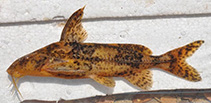| Family: |
Doradidae (Thorny catfishes), subfamily: Doradinae |
| Max. size: |
14.95 cm SL (male/unsexed) |
| Environment: |
demersal; freshwater |
| Distribution: |
South America: Río Apure, Río Capanaparo and Río Arauca of the middle Orinoco in Venezuela; and Río Aguas de Limón in Colombia. |
| Diagnosis: |
Dorsal spines (total): 1-1; Dorsal soft rays (total): 6-6. Differs from all other species of the genus Rhinodoras by the following combination of characters: pale, largely absence of dark pigmentation on ventral surfaces; anterior midlateral plates shallow to moderately deep, depth of fifth plate 16.6-26.2% of corresponding body depth; dorsal and ventral wings of anterior plates about equal in depth; midlateral plates anterior to vertical through pelvic-fin origin usually five; tympanal portion of lateral-line canal weakly ossified with two or three emergent plates, posterior-most largest with low medial ridge or procumbent thorn; postcleithral process moderately long and narrow, depth 23.9-34.5% of length; adipose eyelid moderate to large, horizontal diameter 10.9-14.6% of HL; pectoral fin rays usually eight; one-part gas bladder with terminal diverticula small and fused (Ref. 75166).
Description: Dorsal fin I,6; Anal fin iii-iv,8-11; Pectoral fin I,7-8; Pelvic fin i6 (Ref. 75166). |
| Biology: |
|
| IUCN Red List Status: |
Least Concern (LC); Date assessed: 09 November 2020 Ref. (130435)
|
| Threat to humans: |
harmless |
Source and more info: www.fishbase.org. For personal, classroom, and other internal use only. Not for publication.

